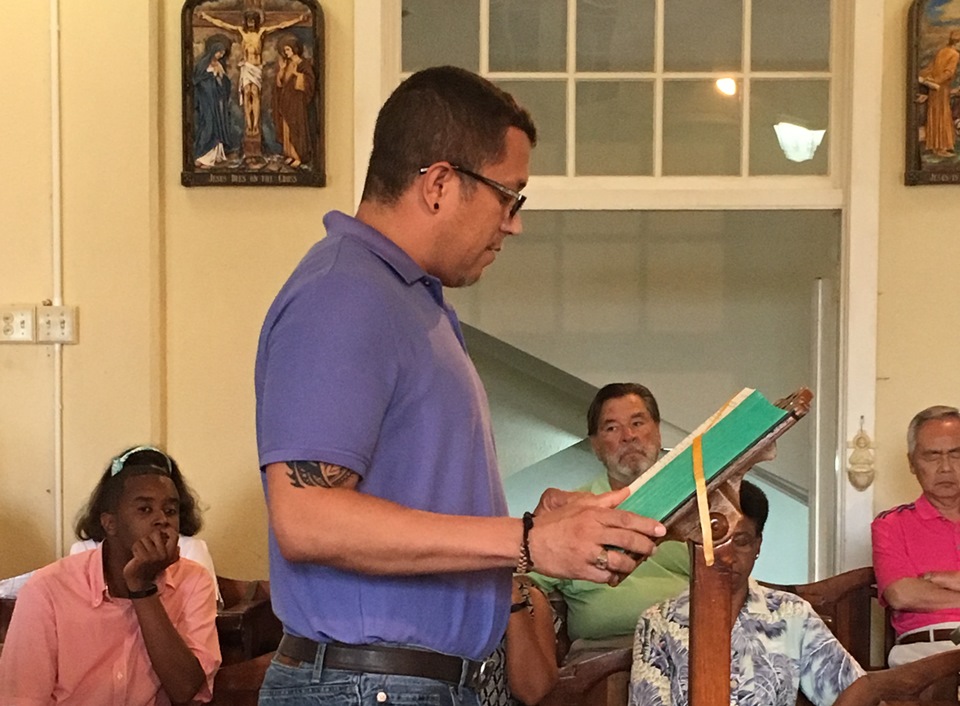SLU Faculty, Alumni, Belizeans Participate in Belize 2020 Retreat
In an effort to build relationships and address global issues of poverty, violence and education, a group of 29 people from the Saint Louis University community joined Belizeans at a retreat in the Central American country earlier this semester.
Christopher Collins, S.J. led the group, which consisted largely of faculty members and alumni of Saint Louis University.
“We held this retreat last year, as well,” he said. “The focus of this retreat was to bring all of us together first of all to grow in faith and also to develop reciprocal types of programs that address the same challenges in both St. Louis and Belize City.”
This trip marks the second retreat in the last two years and is a part of Belize 2020, a grassroots partnership of volunteers focused on improving the quality of life in the Central American nation, particularly in the economically impoverished area surrounding St. Martin de Porres Parish and School, Collins said.
In October 2015, Fr. Provincial Ron Mercier joined Saint Louis University President Fred P. Pestello, Ph.D., and St. Martin de Porres pastor Matt Ruhl, S.J. in signing an agreement and speaking at the event hosted by the university and Belize 2020.
"Belize is in the DNA of the Jesuits of this province, Mercier said at the signing ceremony. “It is so much more than a mission; it is an essential part of who we are.”
In all, nearly 50 people, 20 who live in Belize, participated in the most recent retreat, including SLU faculty:
- Collins Airhihenbuwa, Ph.D., dean of the College for Public Health and Social Justice;
- Carol Beckel, Ph.D., assistant professor of physical therapy and athletic training;
- Gabriel Carrillo, MSW, assistant clinical professor of social work;
- Jami Curley, Ph.D., MSW, associate professor of social work and director of the Master of Social Work program;
- Mary Hastings, M.D., adjunct assistant professor in the School of Medicine’s Department of Family and Community Medicine and staff physician at St. Louis County Health Department;
- And Bryan Sokol, Ph.D., associate professor of psychology and Director of the Center for Service and Community Engagement.
On this retreat, Belizean participants and SLU practitioners in public health, social work, physical therapy, occupational therapy and medicine met within the framework of reciprocity, sharing experiences. Among the activities, the participants celebrated Mass, visited the parish school and toured Belikin Beer brewery, which is run by a SLU alumnus Nolan Michael (A&S ’96, GRAD ’98).
The opportunity to meet people from another community in a different part of the world offers a sense of connection, Collins said. It also provided a richer awareness that these problems transcend borders, present the same complex issues and can lead to the same devastation and destruction, regardless of language or location, he said.
“We did not go there to fix their problems. We learned that our collective commitment to community engagement – fostering education, discussing health and social needs and sharing spiritual affirmation – helps all of us engaged in this important work,” he said. “These issues are universal.”
The multi-year plan includes programming in education, economic development, health care and pastoral services.
In 2014, a group of people from the province, SLU, St. Martin de Porres and St. John's College in Belize got together for a “summit” to create a multi-year plan to address problems of drug and gang violence, unemployment, poverty and family instability in Belize City through collaboration in education, economic development, health care and pastoral services.
The initial project focused on education at St. Martin de Porres parish school, which is in one of the most violent neighborhoods in Belize. The school serves more than 700 students.
Ongoing efforts on the part of SLU’s School of Education faculty provides for early childhood and special education, counseling, art and music programs, extended-day and extended-year programs, and health assessments. Since the initial visit, SLU education faculty members continue to skype and work with educators in Belize, Collins said.
"Educating the young, fostering health, and nourishing the hearts and souls of all people form the core of any way forward," Mercier said.
Another ongoing project, which is in collaboration with the Diocese of Belize, primarily focuses on teacher education. Each year, SLU provides two full-tuition fellowships to Belizean educators seeking graduate degrees with the plan for recipients to return to Belize for a minimum of five years.
“It is meaningful to go to another setting and see the effects of poverty and violence and drugs on young people in that community,” Collins said. “It helps us come home and see St. Louis in a different way.”


















